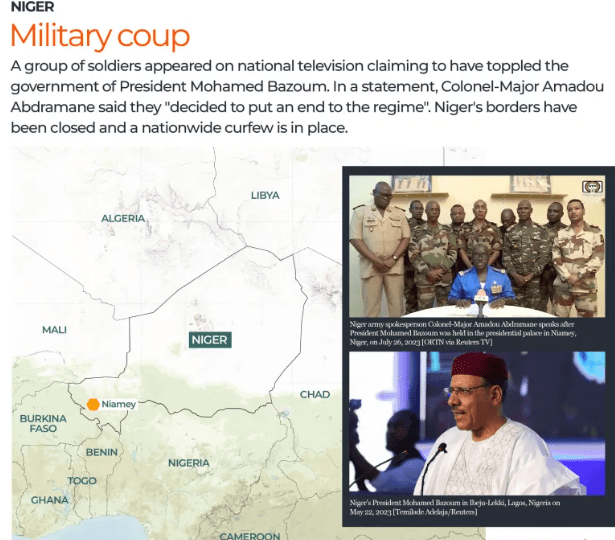Nigerian President Mohamed Bazoum responds defiantly on Twitter following a coup attempt by soldiers. The country’s foreign minister claims the entire military does not back the takeover, but the army chief expresses support for the junta. International leaders, including the US and France, condemn the coup and call for the president’s release.
Nigerian President Mohamed Bazoum faced a challenging situation when troops from the presidential guard took him captive in an attempted coup on Wednesday. While the foreign minister asserted that the takeover lacked full military support, the army chief later expressed his backing for the junta.
As a crucial Western ally in the fight against Islamist militants, President Bazoum’s situation drew attention from the US and France, both of which have military bases in the uranium-rich country. Both nations condemned the coup, with US Secretary of State Antony Blinken assuring the president of Washington’s “unwavering support.” International bodies like the UN, the European Union, and Russia also called for President Bazoum’s immediate release.

Responding to the turmoil on Thursday morning via Twitter, the 64-year-old president declared, “The hard-won achievements will be safeguarded. All Nigeriens who love democracy and freedom will see to it.”
Amidst heavy rain causing delays, coup supporters gathered in the capital, Niamey. Some congregated outside the National Assembly, with a few displaying Russian flags and others holding up hand-written signs denouncing France and foreign military bases. Outside the headquarters of the president’s PNDS Tarraya party, protesters expressed their frustration by stoning and setting fire to vehicles, accusing the party of corruption and insufficient efforts to combat the ongoing jihadist insurgency.
Recent coups in neighboring Mali and Burkina Faso, triggered by Islamist uprisings, resulted in new military leaders aligning with Russia after falling out with France, the former colonial power that once ruled Niger. Some pro-Kremlin commentators on social media have expressed support for the coup, but as of now, there is no evidence of Russian involvement, and Moscow urges a peaceful resolution.
The coup was announced by Colonel Major Amadou Abdramane, who cited reasons such as deteriorating security, poor economic and social governance. The presence of all branches of the security forces during the announcement suggests unity within the military regarding the coup.
The situation has divided the people of Niger, with some expressing shock and distress. During the coup attempt, hundreds of the president’s supporters protested and demanded the military return to the barracks. The protest dispersed after warning shots were fired, and while they refuse to accept the coup, their future actions remain uncertain.
This coup poses additional challenges for French and Western efforts to restore stability to the Sahel region of West Africa. With neighboring Mali turning to Russian support, Western influence in the region appears to be diminishing. The insurgent groups associated with Islamic State and al-Qaeda are likely to benefit from the instability, poor governance, and local discontent caused by the coup.
Niger’s Foreign Minister Hassoumi Massoudou called on the population to oppose the takeover, emphasizing the potential for resolution through dialogue. Efforts at mediation are ongoing, with Benin’s President Patrice Talon leading a mission on behalf of the West African regional bloc, Ecowas.
Niger, a vast arid country on the fringes of the Sahara desert and one of the world’s poorest nations, has a history of political instability, with four previous coups since gaining independence from France in 1960, along with several attempted coups.